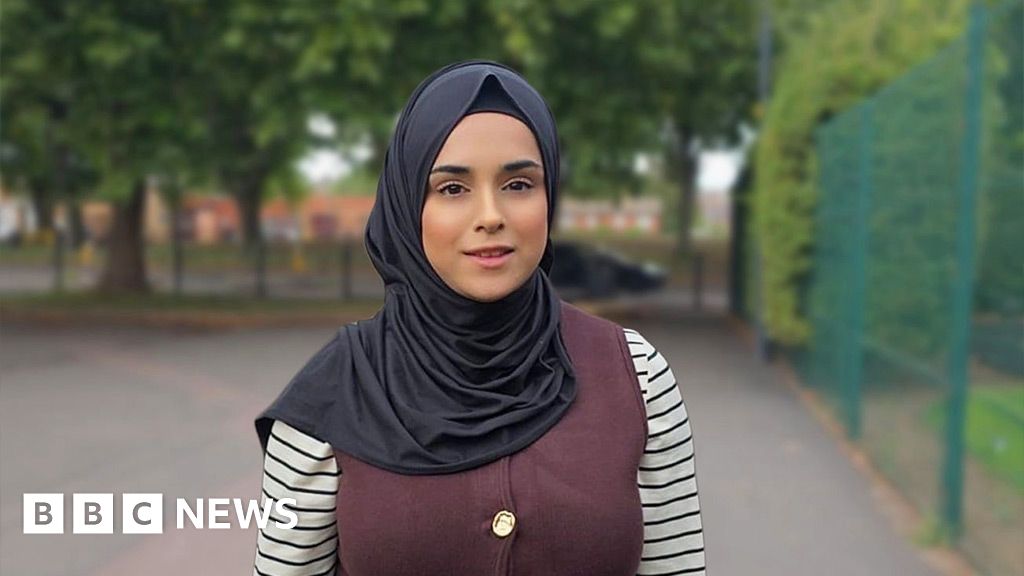Natasha TurneyBBC Investigations, East Midlands
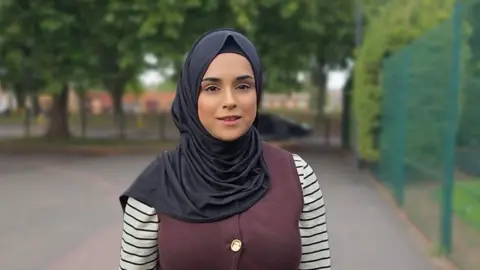 Supplied
Supplied“I got picked last because I wore the hijab, they wouldn’t call me Selina, they’d call me hijabi, so I stopped going.”
A fan of sport, Selina tried a local female team but says she faced racism and alienation.
The experience made her lose confidence and feel worthless.
Then, after giving birth, she sunk into depression, struggling with her mental and physical health, a time she describes as the “the lowest point in her life”.
But then she found about a class to help women at the Pakistani Community Centre in Normanton, Derby, which led to her joining the weekly exercise sessions.
Some names have been changed to protect the identities of the women who have shared their experiences.
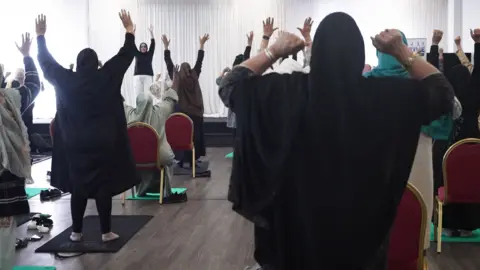
Research from Sport England shows 42% of British Muslim women are “inactive” – almost double the figure for the female population as a whole.
Meanwhile about 30% of British Muslim women aged 65 or older say they are in “bad or very bad health”, compared to just 13% of females overall, according to the latest Census data.
This is highlighted by charity The Health Foundation, which shows Derby’s Normanton and Arboretum wards as having one of the lowest life expectancy rates in the city.
It has prompted the exercise project, which aims to empower more Muslim women to become more active to positively impact their health and mental wellbeing.
‘We reclaimed this space’
Selina is among 300 women who have been attending fitness classes every week there over the past three years.
Inspired by older women who take part in Pilates and soccercise, Selina has not only seen an improvement in her health but a renewed outlook on life.
No longer depressed, Selina now has a focus, training to be a coach to deliver sport sessions at the centre.
“We reclaimed this space because we don’t have to try to fit in,” she said.
“We are who we are, we are proud to be who we are and we are not scared.”
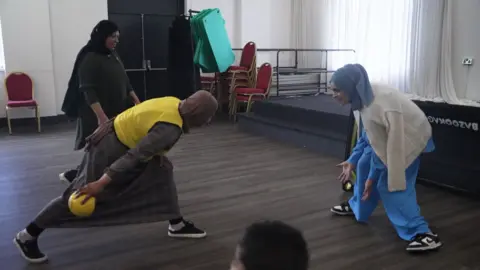
One of the fitness class participants, Habiba – not her real name – told the BBC she wanted to exercise, even though her husband told her not to.
The 68-year-old exercises to help ease the pain of her arthritis, and has not stopped despite saying her husband’s priority was that she looks after him, the house and the children.
“My husband says ‘you don’t need to do this’,” she said.
“I make sure I cook, clean and everything is done in the house before I leave, so he can’t complain when I’m not there.”
Also struggling with joint pain, Habiba visited the centre in secret having heard about the sessions, wanting to learn how to swim in her late 60s despite never stepping foot in a pool before.
Habiba recalls there being a cultural “taboo” attached to women of a certain age in their community exercising.
She wants to stay active and although her husband doesn’t agree, she said: “I’m lucky my son is supportive and backs me.”
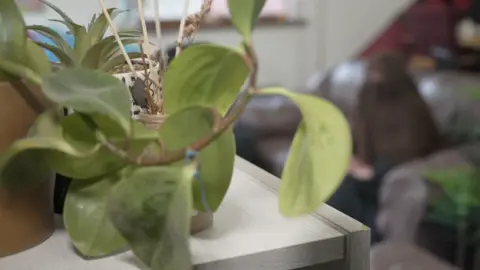
Habiba said by regularly taking part in swimming and Pilates sessions, she had seen a significant improvement in her health, with joint pain reduced and movement eased.
“I do everything for him [my husband], so now I want to do something for myself,” she said.
A relative of Habiba told the BBC the classes were not something their community would have previously thought of doing.
“The majority of our Asian people don’t do these things, don’t go out and about, they don’t go swimming as well, I think because of the culture. But now we’re more aware of it, we do,” they said.
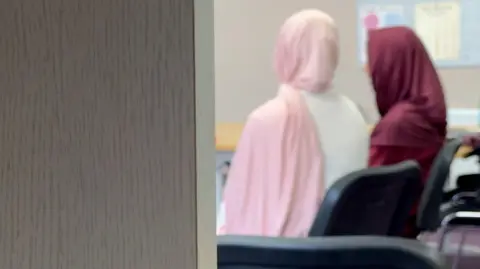
The latest Census information shows the largest ethnic group in Normanton and Arboretum wards is Asian, with Islam the most widely practised religion.
It is also one of the most deprived areas of the city.
The link between deprivation and poor health was highlighted by The Muslim Council of Britain as part of its own 2025 Census report.
Neighbours Hawa and Anaiya attend Pilates and IT classes weekly, supported by their families.
But they told us their friend has been unable to join them.
“Her family’s not supportive that much, they said she can’t come here,” Anaiya said.
‘Teach other girls’
Hawa and Anaiya explained how their husbands have embraced their desire to better themselves through the classes at the Pakistani Community Centre, which they said had helped them both physically and mentally.
“We’re very confident now,” said Anaiya.
“Before we came here we were very shy,” Hawa added, explaining that previously, she was unable to go to GP appointments with her children without her husband.
“We learn something, and now we teach other girls to come here and join the centre,” she said.
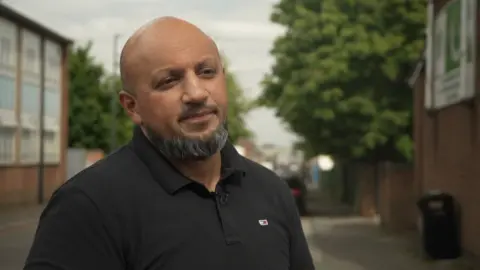
The women’s exercise project was initially set up by Amjad Ashraf, and the team from DE23 Active – a five-year project promoting physical activity in the Normanton and Arboretum wards.
Also a member of the Derby Health Inequalities Partnership, Amjad has worked with Derby City Council to get the most inactive people moving.
He said research he conducted within Normanton highlighted the barriers stopping women getting active, including safety, prioritisation of household chores and their faith needs.
“In certain households, families weren’t comfortable initially in sending women out into spaces for physical activity as it has stigma and taboo attached to it,” he said.
“It’s about educating people so we overcome that taboo that’s linked with physical activity.”
He is also concerned by life expectancy in Normanton and Arboretum.
Local authority figures show that the average lifespan for both women and men in these areas was up to 10 years lower than other wards in Derby.
‘I was embarrassed’
Back at the centre, swimming coach Tahira recalls her childhood.
“From a young age, no-one encouraged us to do exercise, go swimming or do any type of sport,” Tahira – a mother of two – said.
It’s a far cry from how she has brought up her own daughter, Aliyah, who works at the centre and is described as one of the driving forces there.
However, Tahira recalls how even just a few years ago, she would not even go walking.
“I was embarrassed to go outside and go for a walk in the park for fear of being judged by others worried about what people would think about culture and religion,” she said.
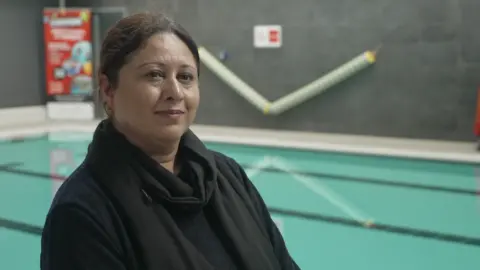
After being encouraged to come along to the first session by her daughter, her mum was completely transformed.
Tahira’s dream to learn to swim was enabled through the local leisure centre introducing new measures to ensure the privacy of the women.
Now, as a coach, she helps others to find freedom in exercise.
“We have blinds so no-one can look in, female lifeguards and I stand by the doors so the women feel safe and secure,” Tahira said.
“I’ve seen the women in my community gain that confidence. Women from the older generations who suffered with joint pains have told me how much it’s helped them.”
